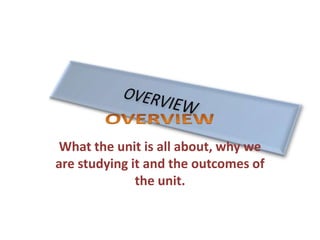
Energy overview
- 1. What the unit is all about, why we are studying it and the outcomes of the unit.
- 2. • Students will learn the value of energy. • The different types of energy sources available. • Why we need energy and it’s uses in the world. • What energy sources are more valuable in different parts of the world. • How the use of energy effects the environment. • How to be energy wise.
- 3. PRIOR -KNOWLEDGE • Basic understanding of different types of energy • Knowledge of web-based learning.
- 4. Curriculum Links This unit of work is aimed at the learning abilities of year 4 students. ACSSU074 – Selecting materials for uses based on their properties ACSIS064 – Considering familiar situations in order to think about possible areas for investigation, make predictions with teacher guidance, choose questions to investigate from a list of possibilities. ACSIS071 - Communicating with other students carrying out similar investigations to share experiences and improve investigation skills and using simple explanations and arguments, reports or graphical representations to communicate ideas to other students ACELY1689 - Reporting on a topic in an organised manner, providing relevant facts and descriptive detail to enhance audience understanding, and beginning to refer to reliable sources to support claims.
- 5. UNIT OUTLINE The unit of Energy comprises of three mini units: What is energy? Which is the introduction into the topic of energy by learning about what it is, what types are available and what it is used for. The second mini topic Renewable and non renewable energy sources looks more in depth at different energy sources, introduces fossil fuels, what they are, where they are produced , what they are used for in daily life and the impact of them on the environment. Finally the third mini unit titled Energy smarts., links the usage of energy with the impact on the environment and ways these detrimental effects can be reduced by talking about having energy smarts through useful tips and products that are available to start saving energy in the home and school.
- 6. OUTLINE CONTINUED RESOURCES AVAILABLE • Online animations and information videos • Online interactive activities STUDENT BENEFIT • Students can get basic information on the topic through visual/audio stimulations. • Students explore e -learning and scaffold learning through interactive play
- 7. OUTLINE CONTINUED RESOURCES AVAILABLE • Planned experiments • Creative and cooperative assessments. STUDENT BENEFITS • Students are involved in hands on learning thinking and predicting outcomes to further extend their knowledge of energy types • Students can integrate learning, plan, research and present ideas in a relevant, creative and meaningful way.
- 8. THE PURPOSE The unit will take place over a 5 week period. During this time the students will investigate and discover what energy is, why it is important, how it is used, how it affects the environment, why we need energy and how to be energy wise. Through a series of interactive tasks and navigational experiences through links and other medial e-learning tools, students will ultimately increase their knowledge of energy. These specifically planned tasks range in visual and auditory to kinaesthetic experiences to enable all areas of learning to be challenged. Students will interact with each other and collaborate ideas to answer investigative questions related to the topic of energy. Assessment tasks will be placed in each mini unit to provide a reflective review platform of the concepts learnt so far. The final assessment will comprise of an exam based on concepts learnt over the three mini units. Students will need to remember facts, apply knowledge to solve problems and collate ideas on improving the worlds energy crisis. Throughout the learning of the unit students will research, design, investigate and predict outcomes based on the principles and concepts of energy.
- 9. ASSESSMENT • Choose an energy source and present it using an original and creative means ensuring all information is present. • Student debate Renewable vs Non – renewable on a global basis. • Design an draw/build an energy efficient house of the future try and think of new ideas to make your house stand out from the rest. • Energy exam – series of multiple choice questions based on the whole unit. • NOTE: The aim of the assessments are based on Blooms Taxonomy of creative thinking.
